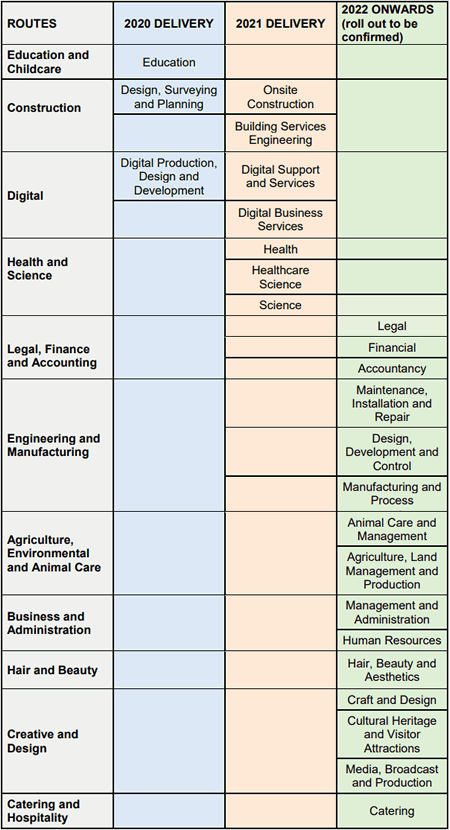T levels: what maths teachers need to know
What maths teachers need to know about the post-16 qualifications that will stand alongside A levels and apprenticeships
20/05/2019

What are T levels?
The new ‘T levels’ (Technical Levels) are a two-year technical programme for young people aged 16 to 19. They combine classroom study and workplace experience, providing a vocational alternative to A levels. T levels are designed to equip students to enter their chosen occupational area or to continue study.
How will they affect me?
For KS4 teachers, knowing the basics about T levels will enable informed discussion with your students regarding post-16 pathways. The mathematical requirements of T levels could be a motivating factor for students in KS4.
FE maths teachers may be asked to teach some of the mathematical content for the new qualifications. Some school sixth forms may be able to offer T levels in the future.
Tell me the basics...
T levels:
- Are Level 3 qualifications, designed as a technical alternative to A levels
- Are set to become one of the main post-16 choices alongside A levels and apprenticeships
- Will carry UCAS points equivalent to three A levels
- Require at least Level 2 (GCSE grade 4+ or equivalent) Maths (and English) qualification by the end of the course (some T levels may require more)
- Are being offered first by around 50 high-performing providers from September 2020.
How are T levels different from current technical education courses?
T levels are expected to involve around 1,800 hours over two years – a significant increase on current technical courses. Roughly 20% of the time will be spent on placement.
Apprenticeships (typically 80% placement and 20% classroom) will continue to be the preferred choice for those wishing to learn on-the-job, while earning, and with a clear idea of the occupation they wish to pursue.
What are the entry requirements?
Entry requirements are not prescribed and therefore likely to be set by individual institutions.
For students to pass a T level, there is an exit requirement of Level 2 Maths (equivalent to GCSE grade 4+), as well as the technical mathematics relevant to each specific course. Passing GCSE in Year 11 gives students the opportunity to gain and bank the Level 2 Maths requirement before starting T level study.
When will T levels start to be taught?
Initially T levels will be offered by a small number of providers from September 2020, for occupations in three industries:
- Digital production, design and development (digital industry)
- Design, surveying and planning (construction industry)
- Education (education and childcare industry).
Further T levels will follow in 2021 and 2022 in more institutions – for subjects, refer to the table at the bottom of this page.
How are T levels structured?
T level study programmes will be made up of three elements:
- core theory, concepts and skills for an industry area
- specialist skills and knowledge for an occupation or career
- industry placement of 45 days minimum.
What is the mathematical content?
The mathematical content to the three elements above will be taught and assessed in the occupational context. Ten General Mathematical Competences (GMCs) have been specified to cover the mathematics required for the full range of courses. These are listed below. From these, each T level will include the GMCs relevant to that industry.
- Measuring with precision
- Estimating, calculating and error spotting
- Working with proportion
- Using rules and formulae
- Processing data
- Understanding data and risk
- Interpreting and representing with mathematical diagrams
- Communicating using mathematics
- Costing a project
- Optimising work processes.
How are T levels assessed? Is the maths content assessed separately?
The mathematics within T levels will be assessed as an integrated part of the whole rather than by separate assessment.
The core content will be assessed externally through an exam.
The occupational specialist content will be assessed using assessment methods that allow judgements to be made about whether students have met the level of competence expected.
How can I find out more in preparation for the start of teaching?
Read the DfE’s Introduction of T Levels, May 2019
Table from the DfE’s T Level Action Plan 2018
